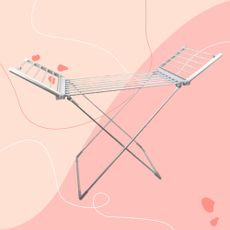Best duvets – tried and tested duvets for keeping you warm when temperatures drop
We’ve reviewed and rated the best duvets on the market to help you find the right option for you – from the best winter duvets to the best feather and down duvets for staying warm when the weather is cold
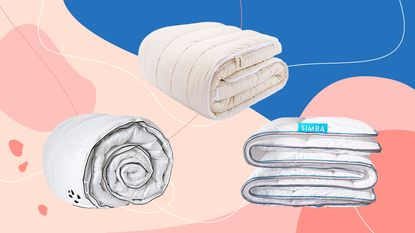

Quick Menu
The best duvets can add a little more luxury to bedtime, helping you to transform your bed into a place to cosy up and retreat to after a long day.
A good duvet can also mean you get a better night's sleep by keeping you warm when temperatures drop, without causing you to overheat in the middle of the night.
Tried and tested by the Ideal Home team, we’ve slept under a whole host of the best duvets on the market – including options from Simba, Marks & Spencer, John Lewis & Partners, Soak & Sleep and many more bestselling brand names – to find the duvets that are worth the investment.
Whilst you're upgrading your sleep comfort, it's worth having our guide to the best mattresses on your radar too, but when it comes to finding the duvet of your dreams, this page has all you need to know to score yourself a more peaceful slumber.
How we test
You'll find the general principles of how we review products at Ideal Home on our how we test page, however, there's only one way to test out the best duvets on the market, and that's to do some snoozing on the job!
The Ideal Home team has put multiple bestselling duvets from a whole range of brands to the test for this guide, sleeping under each option every night for at least a week to rate each duvet's performance, warmth, breathability, ease of care, and taking into consideration price points to compile our edit of the best-in-class.
Best duvets 2024
Why you can trust Ideal Home
Whether you want a winter duvet to keep you snug as temperatures plummet, you're fed up with overheating during the night and are looking for a more breathable duvet, or you're looking to invest in a duvet that will add some real luxury to bedtime, we've rounded up the best duvets to shop in this guide.
Best winter duvets

Best winter duvet overall
Buy it if: you're looking for the very best duvet for a great night's sleep. This wool-filled duvet is an investment, but we've tried and tested some of the best winter duvets on the market, and in our opinion, this is the cream of the crop. It's the warmest we've come across, keeping our testers warm and toasty throughout the night without any of the overheating or night sweats that occurred with other high-tog options. That's thanks to the naturally thermoregulating properties of wool that allow moisture to escape whilst still providing insulation. Handmade in Yorkshire using 100% traceable British Cheviot wool and certified organic cotton this is also a great eco-friendly option, with wool completely biodegradable.
Don't buy it if: your priority right now is affordability or ease of care. Although it's well worth investing in the great night's sleep it offers, there's no denying the price is prohibitive, and this duvet is dry clean only.

Best all-seasons winter duvet
Buy it if: you're looking for luxury as well as warmth. No duvet fill feels quite as sumptuous as down, and this 90% Hungarian goose-down and 10% goose feather option is one of the best. It's super warm, drapes beautifully, and feels super luxurious. The all-seasons option also offers brilliant versatility; use the 4.5 and 9.0 duvets separately in warmer seasons and combine when the evenings start to drop in temperature to create 13.5 togs of winter warmth. Plus, although it's an investment, the all-seasons design means you'll also be kitted out with cooler tog duvets for spring, summer and autumn.
Don't buy it if: you're on a tight budget as this luxury duvet has a luxury price tag. If you're a hot sleeper or suffer from night sweats then you might find down too warm; opt for a more breathable wool-filled duvet instead to avoid overheating. And, if you're vegan, then the feather and down fill won't be for you.
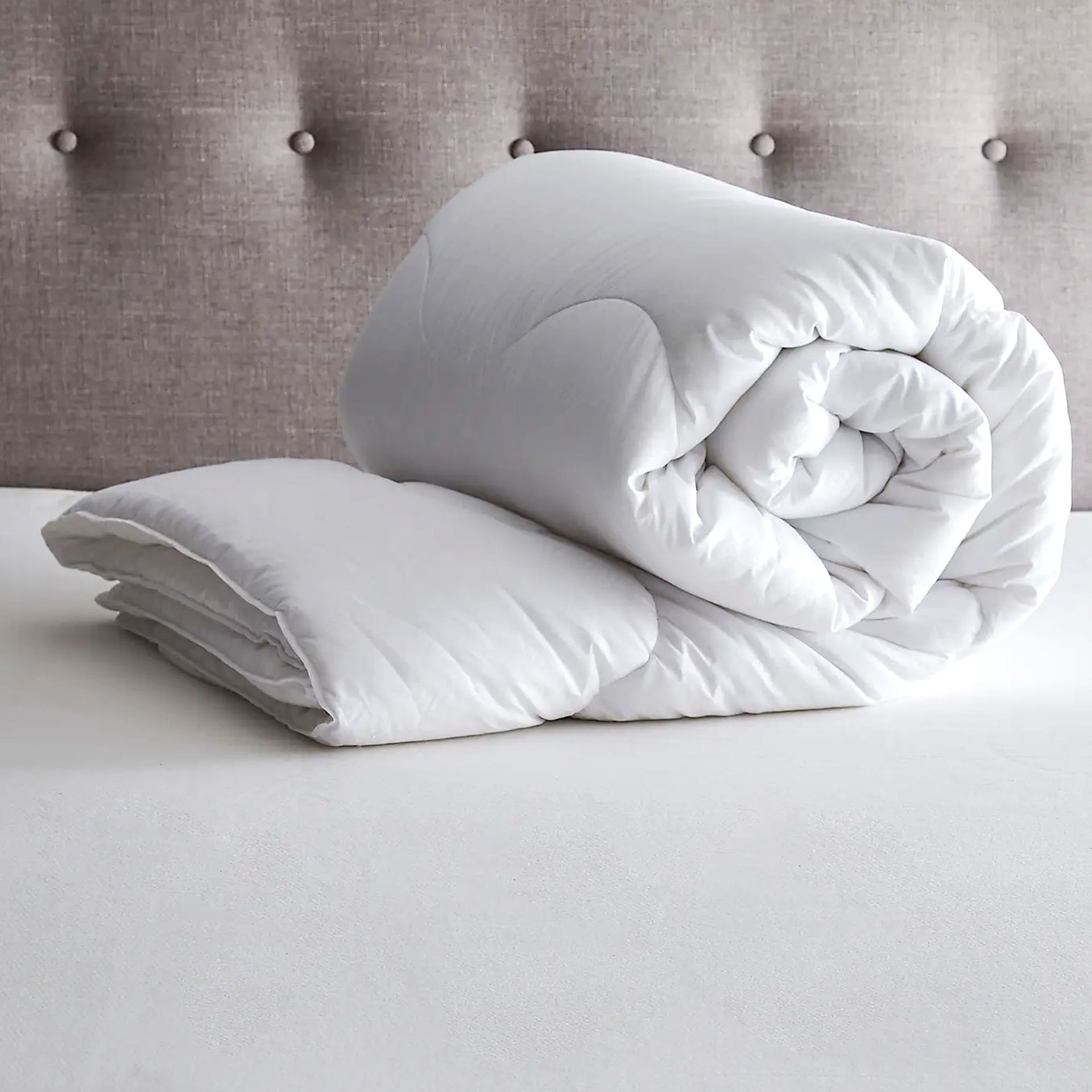
Best affordable winter duvet
Buy it if: you want an affordable winter duvet that still feels both warm and luxurious. This recycled polyester fill duvet has 10% silk mixed in, and whilst the proportion doesn't sound huge, it really makes a difference to the way this duvet feels, with a more luxurious touch and really nice drape on the bed, whilst still being lightweight. Even better it's a relatively budget buy, and made from certified recycled polyester from waste (like plastic bottles or manufacturing off-cuts) which helps the movement towards a more circular economy by reducing waste going to landfill. Compared with virgin polyester, recycled polyester helps conserve crude oil reserves during fibre production.
Don't buy it if: you really want to layer on the warmth. This 13.5 tog duvet is plenty snuggly enough, but we think the wool and down options just pip it to the post in terms of cosiness. That said, this synthetic option is far easier to care for as it's machine washable and can be tumble dried on a low heat setting.
Best all-season duvets

Best synthetic all-season duvet
Buy it if: you're looking for one easy-to-care-for duvet to see you through all the seasons. A synthetic duvet has the benefit of being easy to wash and quick to dry, it's also a great option if you don't like the idea of a duvet filling that utilises animal byproducts. In a bid to limit the impact of synthetic materials on the environment, the duvet fill is also made from recycled PET bottles.
Don't buy it if: you want more versatility over tog mixes, as although we think the combination of 3.5 and 7.5 tog is a good mix, this is the only combination Simba offers. If you're a hot sleeper, you might find a synthetic duvet lacks breathability, Simba combats this with a two-sided design, with one side of the duvet benefitting from technology first developed by NASA that absorbs, stores, and releases heat when you need it for better temperature regulation. Our testers were certainly impressed by its warmth levels.
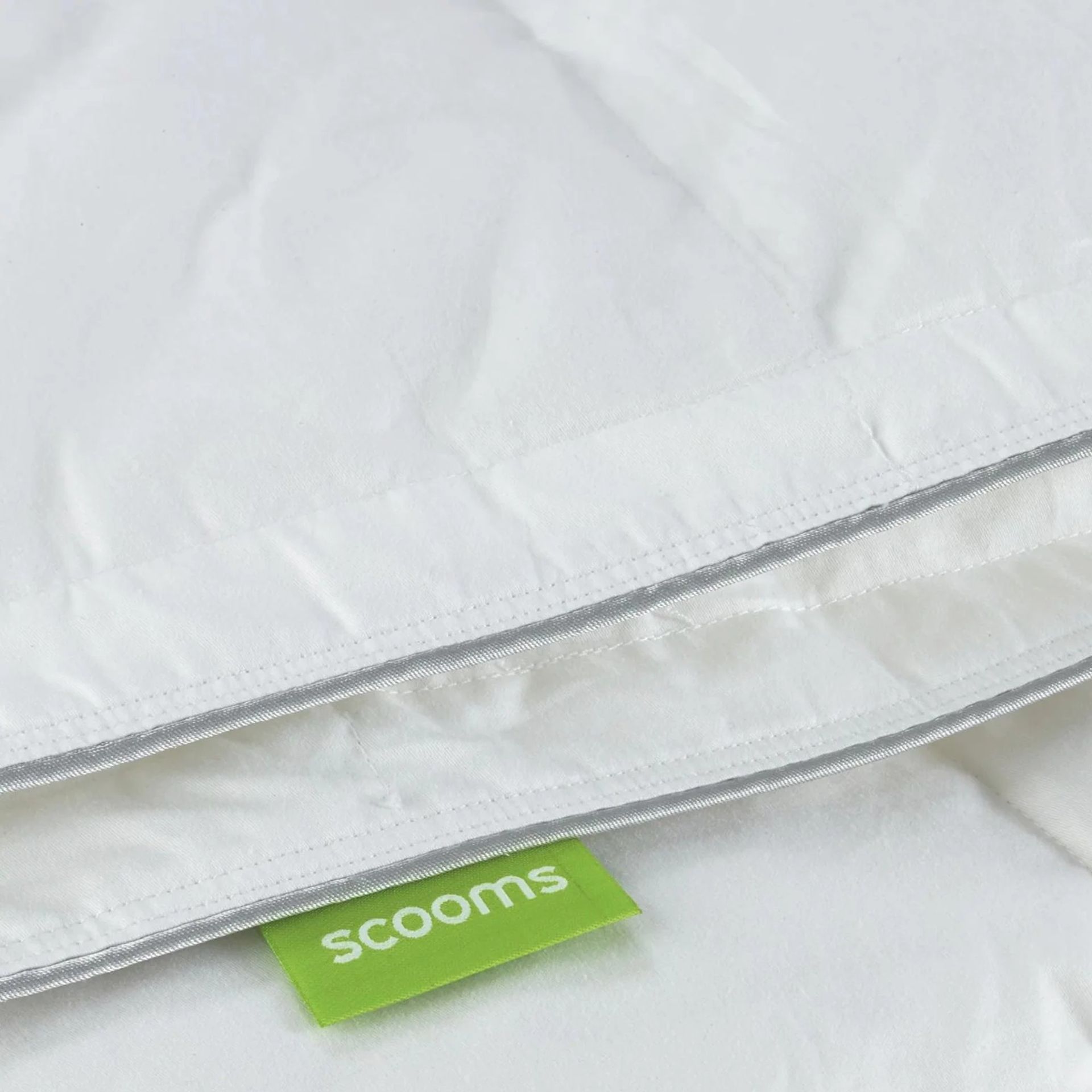
Best luxury all-seasons duvet
Buy it if: you want luxury as well as versatility. This 90% Hungarian goose-down duvet will instantly upgrade your sleep set-up. Scooms also offers a whole host of all-season weight options, including a 7 tog (the 2.5 tog duvet plus a 4.5 tog), 11 tog (the 2.5 plus 9 tog combo), and 13.5 tog (4.5 plus 9 tog). Each all-seasons option comes with press studs to fasten the two duvets together. Personally, we'd opt for the 13.5 tog for year-round versatility.
Don't buy it if: the price makes your eyes water. As well as being the softest duvet fill, down is also the most expensive fill, and 90% Hungarian goose-down is pretty much the best quality you can get. If you're a hot sleeper or suffer from night sweats then you might find down too warm; opt for a more breathable wool-filled duvet instead to avoid overheating. Of course, if you're vegan then the feather and down fill won't be for you.

Best affordable all-seasons duvet
Buy it if: you want an affordable duvet that will see you through spring, summer, autumn, and winter. This 13.5 tog duvet is a mix of one 4.5 tog duvet and one 9 tog duvet, which in our books makes a great combination of weights. Its 30% recycled synthetic fill is also machine washable and quick to dry. No wonder it gets such rave reviews from M&S customers.
Don't buy it if: you want something a little more luxurious. It feels great on the bed, but can't quite compete with a feather and down duvet in terms of snuggle-factor. If you're a hot sleeper, you might also find a synthetic duvet lacks breathability, in that case, a wool-filled duvet will offer the best thermoregulation, this Woolroom option is a great (if more expensive) alternative; Woolroom Chatsworth Collection Washable Wool All-Seasons Duvet.
Best wool duvets

Best wool duvet overall
Buy it if: you want the best of the best. In our opinion this is the best wool duvet money can buy. It's an investment, but it feels far more luxurious than most wool duvets and the attention to detail is second to none. Handcrafted in Yorkshire using 100% traceable British Cheviot wool and certified organic cotton – unlike the wool duvets of most other brands we've tested – the Floks duvet feels lofty and luxurious without being too heavy. It looks great on the bed, and little details like the 100% recycled cotton duffle bag for storage and 'easy-fit' corners are a nice touch.
Don't buy it if: your priority right now is affordability or ease of care. Although we think it's well worth investing in the great night's sleep it offers, there's no denying that this duvet's price is prohibitive, and it's dry clean only. That said, John Lewis discount codes may be able to make the bottom line more palatable.
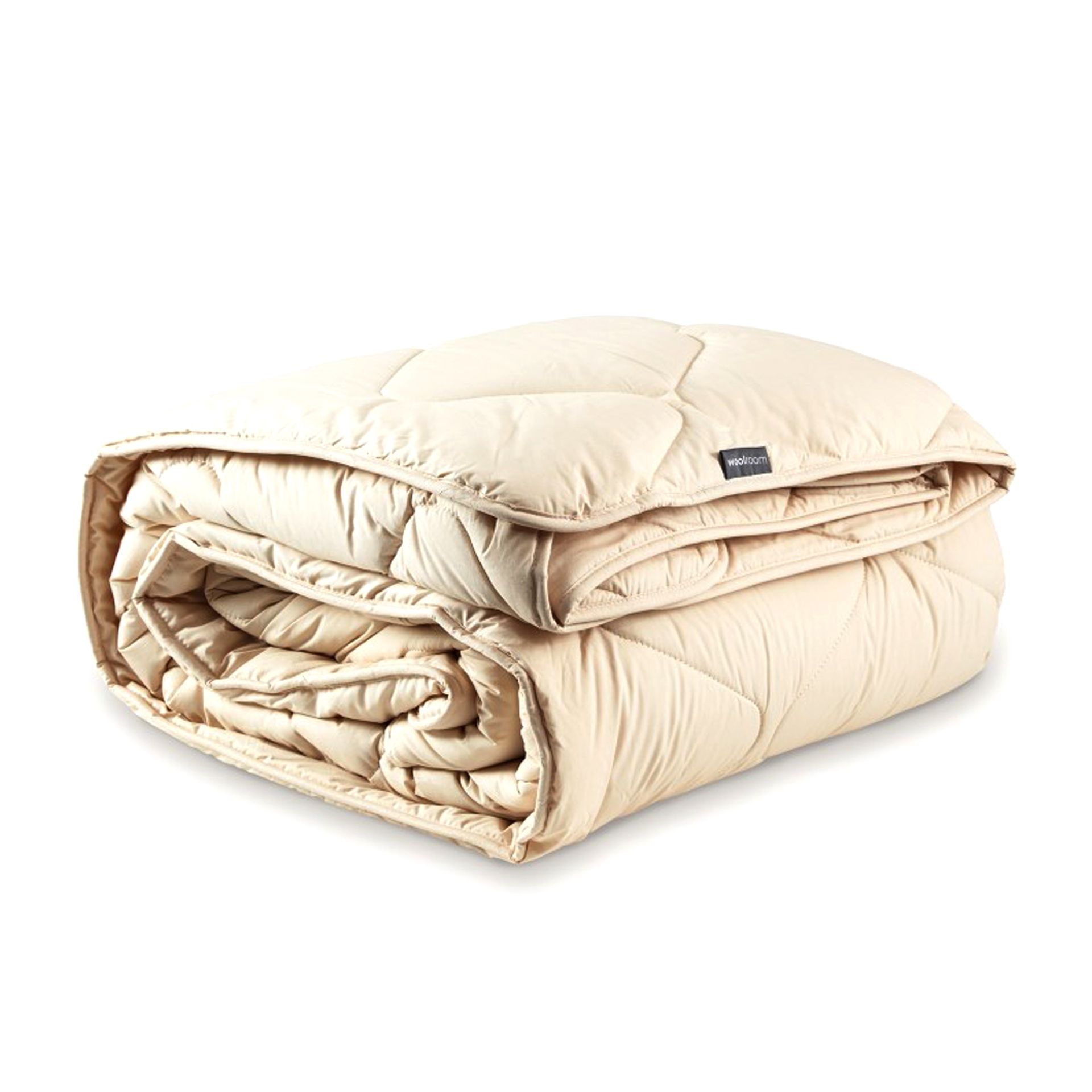
Best washable wool duvet
Buy it if: you want a wool duvet that can be washed. The main selling point of a synthetic duvet is ease of care – the manmade polymers that synthetic duvets are filled with can usually be thrown in the washing machine, washed at 60°c, and are quick to dry. The downside is a synthetic duvet isn't very breathable and can lead to overheating. A wool duvet is far more breathable and far superior at temperature regulation, but they can be harder to care for. Most wool duvets can't be washed, but this Deluxe Washable Wool duvet from Woolroom can be machine washed on a wool cycle at 40°c.
Don't buy it if: you want a duvet that's quick to dry. Although this duvet can be machine washed, it can't be tumble dried. It also lacks loft so doesn't feel as luxurious as the best-in-class Floks wool duvet.

Best budget wool duvet
Buy it if: you're sold on the benefits of a wool duvet, but want one that won't break the bank. Woolroom is one of the forerunners of the 'wool revolution' being one of the first mainstream brands to offer wool-focused bedding. Woolroom's Classic Wool Duvet is one of the brand's first launches, and its still a bestseller because it offers all of the breathable and temperature regulating benefits of wool at a more affordable price point. Like all of Woolroom's bedding, it's also free from harmful chemicals and biodegradeable, making it kinder on the planet.
Don't buy it if: ease of care is one of the most important factors in your duvet hunt; this wool duvet isn't machine washable. It also lacks loft so doesn't feel as luxurious as the best-in-class Floks wool duvet.
Best feather and down duvets

Best luxury feather and down duvet
Buy it if: you're looking for luxury as well as warmth. No duvet fill feels quite as sumptuous as down, and this Soak & Sleep Hungarian goose-down option is one of the best quality we've come across. It's super warm yet lightweight, drapes beautifully on the bed, and feels super luxurious – you'll instantly feel like your bedding has levelled up. The all-seasons option also offers brilliant versatility; use the 4.5 and 9.0 duvets separately in warmer seasons and combine to create 13.5 togs of winter warmth.
Don't buy it if: you're on a tight budget as this luxury duvet also comes with a luxury price tag.
If you're a hot sleeper or suffer from night sweats then you might also find this high down-mix fill too warm; opt for a more breathable wool-filled duvet like Floks Luxury British All Seasons Wool Duvet instead to avoid overheating.
And, if you're vegan, then the feather and down fill won't be for you.

Best all-seasons feather and down duvet
Buy it if: you want the luxury of Hungarian goose-down combined with plenty of weight options. As well as individual 2.5, 4.5 and 9 tog duvets, Scooms also offers a host of all-season combination duvets, with a 7 tog (the 2.5 tog duvet plus a 4.5 tog), 11 tog (the 2.5 plus 9 tog combo), and 13.5 tog (4.5 plus 9 tog). Each all-seasons option comes with press studs to fasten the two duvets together. Personally, we'd opt for the 13.5 tog for year-round versatility.
Don't buy it if: the price makes your eyes water. As well as being the softest duvet fill, down is also the most expensive fill, and 90% Hungarian goose-down is pretty much the best quality you can get. If you're a hot sleeper or suffer from night sweats then you might find down too warm; opt for a more breathable wool-filled duvet instead to avoid overheating. And, if you're vegan, then the feather and down fill won't be for you.

Best budget feather and down duvet
Buy it if: you love the flumph of feather and down, but not the price tag. This budget feather and down duvet has a high feather-to-down ratio which makes it a far more affordable option than our two previous picks, but unlike many other cheaper feather and down duvets we've tested, this one still achieves that soft, squidgy feather and down feel, without any sharp feathers sticking through the lining.
Don't buy it if: you truly want to splash out on the best duvet for your boudoir. This option is very good for its price, but the higher feather mix does mean it feels more 'clumpy' than the 90% down alternatives on our list. That said, this is still a great buy, and the addition of feathers does make the duvet a little more breathable than a duvet with a higher down percentage, albeit not quite as warm.
How to choose the best duvet
Spend some time looking for a new duvet and you'll soon realise there are a whole host of options available. To help you choose the best duvet for your needs we've broken down the basics of duvet shopping below, from understanding tog ratings to working out what duvet filling is best for you.
In fact, deciding on which duvet fill best suits your needs is one of the key factors in getting this purchase right first time. From hollow fibre to goose down, synthetic to natural, the array duvet fillings available can be a little overwhelming, which is where we're here to help.
What is the best duvet filling?
The best duvet filling for you will depend on your sleep and care requirements. If you want a warm yet breathable duvet, then wool is your best friend. If you want an affordable duvet or one that can be bunged in the washing machine and washed at a high temperature then you'll want a synthetic duvet.
We've broken down the pros and cons of most common duvet fillings below.
Wool – in our opinion, wool is a bit of a wonder fibre in terms of duvet fill, and one of the best duvet fillings you can opt for whether it's summer or winter. Insulating, breathable, temperature regulating, hypoallergenic, durable, a sustainable and renewable resource, and bio-degradable at the end of the product's lifespan, it ticks a whole lot of boxes when it comes to the best duvet fill choice. 'Wool works in perfect harmony with your fluctuating temperature', says Chris Tattersall, sleep expert and managing director of Woolroom, 'it also helps to alleviate sleep prohibiting allergies through its exceptional moisture management'. However, not all wool duvets can be washed, so it pays to double-check the manufacturer's care instructions.
Another popular natural duvet filling is down, or, a more affordable mix of feather and down.
Down – long thought of as the Holy Grail of duvet fillings, down creates a plump, squishy and super soft duvet. This natural fill is also far more breathable than a synthetic option, making for a cooler sleep. However, sourced from either duck or goose on an industrial scale, the fill can raise concerns about animal cruelty and won't be the right option for vegans. Look for fill that is certified to be a by-product of the food industry, with Downpass or Downafresh accreditation that denotes ethically sourced and traceable feather and down. Generally, down duvets also aren't machine washable, and will need more plumping, and that luxury feel comes with a luxury price tag to match.
Feather and down – a more affordable alternative to pure down, a feather and down fill bulks out down's fine softness by adding some larger feathers into the mix. Goose feather and down tends to be the most luxurious mix, with duck feather and down the more affordable (yet often a little lumpier) alternative. Generally speaking, the more you spend on a feather and down duvet the better the quality, with some cheaper options resulting in escaped down and feathers that stick through the casing.
If you're looking for a duvet that's more affordable and/or easier to care for, and that can be washed at high temperatures then you might also want to consider synthetic fillings. These duvets are filled with manmade fibres, like polyester and polyamide that are made from petroleum-based plastics.
Hollowfibre – the cheapest duvets you can buy tend to be made of hollowfibre. Made of polyester wadding, hollowfibre fill is dense but lightweight. A hollowfibre duvet is affordable, easy to care for as it can generally be washed at high temperatures, and is anti-allergenic, which makes it a popular choice for kid's bedding. However, over time this duvet fill is most likely to flatten and become lumpy. Synthetics can also cause overheating and night sweats as the plastic polymer fibres aren't breathable and reflect body heat back towards the sleeper, and neither production or disposal at the end of the duvet's life span (plastic is non-biodegradable) is good news from an environmental point of view.
Microfibre – the 'luxury' version of hollowfibre, a microfibre fill is made of much finer strands of polyester resulting in a very lightweight duvet with a, yes, more luxurious feel. Some compare microfibre to the feel of down, but it has the upside of not running the risk of animal cruelty. However, again, being made of synthetics, the environmental impact of production and disposal is a concern. Like hollowfibre, microfibre can also cause overheating.

What duvet tog is best?
Duvet tog is a measure of how effectively a duvet insulates heat and therefore how warm it will keep you during the night. Duvet tog ratings range from 1 tog to 15 tog, with higher numbers offering more warmth.
Although you can get duvets in almost any tog rating, the most common togs are 4.5 tog which makes a great summer duvet weight, 10.5 tog which tends to be the best bet for autumn and spring, and 13.5 tog which offers good winter warmth.
Obviously, it isn't always convenient to have a different duvet for each season, so the middle ground of the 10.5 tog duvet is one of the most popular options.
Another solution is to opt for an 'all-season' duvet. This consists of two separate lighter tog duvets that can be joined together (usually by way of press studs) to make a warmer winter duvet. Most commonly an all-season duvet will include a 4.5 tog and 9 tog duvet that can create a 13.5 tog duvet once combined, or a 4.5 tog and 10.5 tog duvet that will create a warmer 15 tog combination.
Read more in our guide to what tog duvet to buy as well as finding out when is the right time to switch to a summer duvet.
What size duvet do I need?
Although it will mean spending a little more, and may depend on your bed frame height and style, we'd generally advise sizing up with your duvet, especially if you sleep with a partner.
That means that if you have a single bed you should opt for a double duvet, on a double bed opt for a king-size duvet, and if you have a king-sized bed then opt for a super king duvet. (And if you're lucky enough to be the owner of a super king bed then you might want to try and track down an emperor duvet, although they are a harder size to find).
Opting for a duvet that's the size up from your mattress will avoid one partner accidentally pulling the duvet off the other during the night, and keep you both warmer in bed by offering enough fabric to tuck around both your bodies rather than the duvet tenting between you both and allowing in draughts.

FAQs
What's the highest tog duvet?
The highest tog duvet you can buy is usually 15 tog, although we have seen some all-season duvets (where two separate duvets of differing togs are combined into one warmer duvet) offering a combined warmth of up to 18 tog.
That said, personally, we think 13.5 tog remains one of the best winter duvet weights, with some finding 15 tog can retain heat a little too much during the night and lead to overheating.
Emily Attwood, founder of sleep-brand scooms agrees, ''We’d always advise a 9 tog to 13.5 tog for the winter months as this is ideal and will keep you warm. If your house is always on the warmer side, then a 9 tog duvet would probably suit you better throughout the winter months, and you wouldn’t want to go any higher. This will prevent you from overheating which can disrupt your sleep.'
As well as investing in a heavier duvet, when winter rolls around you could also consider adding one of the best electric blankets on the market to your bed in order to achieve a cosier night's sleep. More energy-efficient and cost-effective than turning the central heating up at night, an electric blanket can cost as little as a few pence per hour to run.

What duvet is best for winter?
After much testing, we think 13.5 tog is best tog duvet for winter, with most of our testers finding 15 tog can retain heat a little too much during the night and lead to overheating.
Duvet 'tog' ratings are a measure of how effectively a duvet insulates heat and therefore how much warmth a duvet offers. Tog ratings range from 1 – 15 togs, with higher numbers offering more warmth and therefore making the best winter duvets.
We'd also highly recommend a wool-filled duvet for winter. Wool is naturally thermoregulating which means it insulates to make things cosy whilst remaining breathable to avoid overheating or night sweats. Feather and down options also trap heat well, and feel super luxe, but our hot sleepers found them a little less breathable in our testing process.
What tog duvet is good for all year use?
If you’re struggling to work out what the best tog duvet is to see you through summer heatwaves and plummeting winter temperatures then an all-season duvet could be the answer.
An all-season duvet is made up of two separate duvets of differing togs – one lightweight and one midweight – that can be attached together into one single heavyweight duvet or used separately. The idea being that you can mix and match to ensure you have the perfect weight duvet for spring, summer, autumn, and winter.
This makes an all-season duvet a super useful addition to your year-round sleep set-up. The only downside being that you will need space to store whichever duvet you aren’t using, and – seeing as you’re basically investing in two duvets – an all-season duvet is generally more of an investment, albeit a worthwhile one.
Duvet vs comforter: What is the difference?
Although a mostly American term, a comforter is the word for an extra thick, sometimes quilted blanket which is intended to drape over beds for extra warmth in winter months. While a duvet has a thick natural or synthetic filling inside an outer bag which is used with interchangeable covers to protect it. A duvet is typically a lot more lightweight than a comforter due to its pillow like fillings.
Get the Ideal Home Newsletter
Sign up to our newsletter for style and decor inspiration, house makeovers, project advice and more.

After studying Print Design at Winchester School of Art, Amy spent multiple years working in the interior industry, including styling and visual merchandising for many well-known brands. She’s now Ecommerce Editor at Ideal Home, offering expert advice on the best products for decorating your home and ensuring it functions smoothly. That includes sourcing stylish yet affordable furniture – from the best sofa beds for combining style, comfort, and function, to the best artificial Christmas trees for a stress-free festive season – helping our readers to find the best mattress for their sleep style, and testing top-rated dehumidifiers and air purifiers to narrow down the best-in-class.
-
 Ugly lawns are the shocking new gardening trend that experts are urging us all to try this year
Ugly lawns are the shocking new gardening trend that experts are urging us all to try this yearLawns are about to get a major makeover, thanks to this Scandi garden trend...
By Kayleigh Dray
-
 A bold design trick turned this dated room into a stunning master bedroom and dressing room for £300
A bold design trick turned this dated room into a stunning master bedroom and dressing room for £300The large cavernous room was divided up to create a cosy master bedroom and bespoke dressing room
By Laurie Davidson
-
 George Home is selling a heated airer for the lowest price we've seen – it's even cheaper than Aldi
George Home is selling a heated airer for the lowest price we've seen – it's even cheaper than AldiSnap up this winter must-have at a budget price
By Jullia Joson


